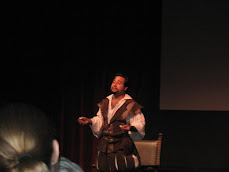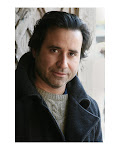MOBILE, Alabama -- Saturday was a day
for daunting battles. Florida Atlantic University faced grim prospects in
Tuscaloosa, LSU ventured into peril in Auburn, and Bernardo de Gálvez invaded
Mobile for the second time.

Gálvez came in with a
winning record, though his sole previous victory had taken place more than 200
years ago. Back then, it was Gálvez himself, leading a fleet that took the city
away from the British home team. On Saturday, it was actor
Chaz Mena, depicting Gálvez in the one-man play “Yo Solo, I Alone” at
the Mobile Saenger Theatre.
The original Gálvez
had it easy: He just had to lay siege to Fort Charlotte after having his fleet
wrecked by a storm in Mobile Bay. Mena sailed in at the end of a gorgeous
September Saturday, meaning he had to compete with every outdoor charm the Gulf
Coast has to offer. He also went head-to-head with an Auburn-LSU match that had
turned out to be particularly interesting.
This was not
auspicious scheduling for a history lesson, and it showed in the turnout, which
appeared to number fewer than 250 people. Robert Sain, the executive director
of the Centre for
the Living Arts and one of the architects of a 2012-2013
Saenger season that puts less emphasis on popular music in favor of a diverse
range of theatrical shows, began the evening by inviting thinly scattered
patrons to move on up to the Saenger’s first few rows.
Mena, like Gálvez, was
undaunted by the odds. He schmoozed the audience just as charmingly as Gálvez,
in his depiction, entered New Orleans society as governor of Spanish Louisiana.
He worked every inch of the stage, making the most of every prop, up to and including
the three members of the Mobile Symphony Orchestra who were on stage to provide
accompaniment.
Like Gálvez, Mena
brought fire as well as charm, portraying a man with a thirst for victory that
ran through each of his colorful anecdotes. The first army he led out of New
Orleans, the one that took Baton Rouge from the British, was a bunch of “misfits,”
he said, a ragtag band of irregulars who spoke in French and Spanish and cursed
in English. As he described his epic battle for Pensacola, even the slow,
humble work of trenching seemed dramatic.
 The real delight of
the evening came from Mena’s ability to relate Gálvez’ Gulf Coast campaign –
which ultimately drove the British out of a stronghold at Pensacola – to the
broader context of the American Revolution. Mena’s Gálvez quoted John Adams (“Fear
is the foundation of most governments”), praised Gen. George Washington and
marveled at the way that in this new land, diverse groups of men could come
together to fight for their liberty.
The real delight of
the evening came from Mena’s ability to relate Gálvez’ Gulf Coast campaign –
which ultimately drove the British out of a stronghold at Pensacola – to the
broader context of the American Revolution. Mena’s Gálvez quoted John Adams (“Fear
is the foundation of most governments”), praised Gen. George Washington and
marveled at the way that in this new land, diverse groups of men could come
together to fight for their liberty.
For anyone driven to despair
by the squabbling of the current presidential campaign, such talk could serve
as a welcome tonic. In this sense at least, the presentation couldn’t have been
better timed.





















